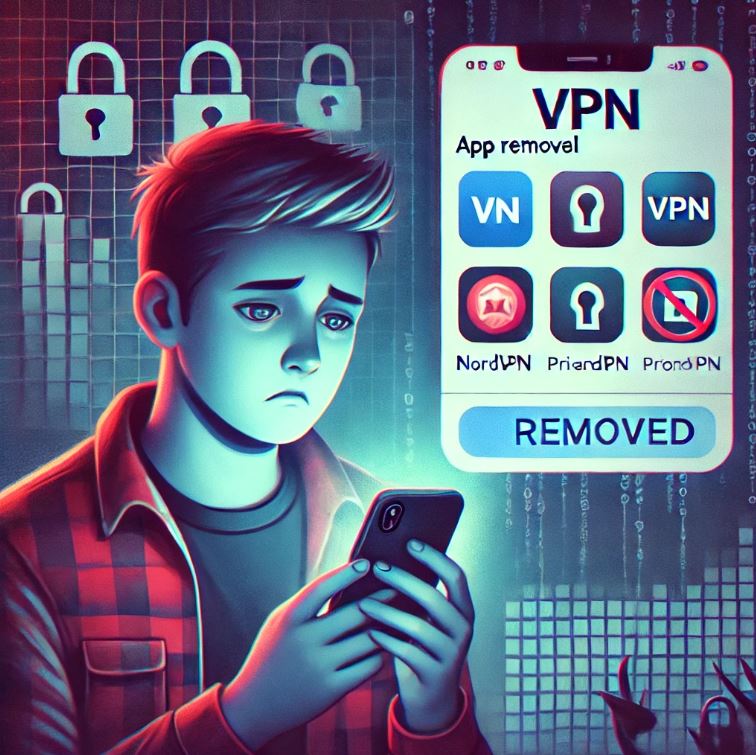In a recent move, Russia has compelled Apple to remove VPN apps from its App Store, including major players like NordVPN and Private Internet Access (PIA). This action has sparked concerns over online privacy and access to information within the country.
Key Takeaways
- Government Censorship: Russia’s Roskomnadzor has forced Apple to remove at least 25 VPN apps, including top names like NordVPN.
- Impact on Users: The removal restricts Russian users’ access to VPN services, affecting their online privacy.
- Industry Response: VPN providers are rallying against Apple’s compliance with Russian demands.
The VPN Purge in Russia
Roskomnadzor’s Demand
On July 4th, 2024, Russia’s Roskomnadzor, the Federal Service for Supervision of Communications, Information Technology, and Mass Media, demanded that Apple remove 25 VPN apps from its App Store. Among the affected apps are NordVPN, ProtonVPN, Planet VPN, Hidemy.Name VPN, and Private Internet Access.
The official reason given was that these apps “solicit, promote or encourage criminal or clearly reckless behavior.” This marks a continuation of Russia’s longstanding efforts to control its citizens’ online activities and suppress tools that provide privacy and access to uncensored information.
VPN Providers Respond
VPN providers Red Shield VPN and Le VPN confirmed the removal of their apps, sharing screenshots of the notices from Apple. According to Le VPN, they were not given the standard 24-hour notice to address the issues, making it impossible to comply within the given timeframe.
In a blog post, Le VPN criticized the lack of time to respond and highlighted the broader implications of Apple’s compliance with Russian demands.
Industry Reaction and Petition
Calls for Reinstatement
Following the removal, Le VPN and other affected providers launched a petition urging Apple to reconsider its decision. With over 1,250 signatures, the petition accuses Apple of aiding Russian censorship and calls for U.S. Congress to address the situation.
The petition describes Roskomnadzor as a “Russian censorship agency” and condemns Apple for “helping Putin and his regime deny access to free information.”
The Broader Context
Since the conflict with Ukraine began in early 2022, VPN usage in Russia has surged. The Kremlin has responded by intensifying its control over the internet. In addition to banning social media platforms like Twitter and Facebook, Russia passed a law in July 2022 to block any services providing information on bypassing site blocks, including VPNs.
On March 1st, 2024, Russia enforced a complete ban on VPN services advertising their ability to unblock restricted content. This move was part of a broader crackdown on privacy tools and information access.
Historical Context of VPN Restrictions in Russia
Previous Bans and Restrictions
This isn’t the first time Russia has targeted VPN services. In June 2019, the Kremlin began blocking VPNs that refused to comply with censorship laws, affecting services like ExpressVPN, NordVPN, TorGuard, and IPVanish. These actions have continued sporadically, creating an ongoing struggle for VPN providers operating in Russia.
While using VPNs remains legal, Russian law requires government approval for providers, and using VPNs to access blacklisted content is illegal.
Recent Developments in the VPN Industry
Enhanced Security Measures
As of July 11, 2024, VPN services are enhancing their security protocols to better protect users in restrictive regions. NordVPN, for instance, has introduced advanced features to circumvent censorship and maintain user privacy.
AI and Automation
Some VPN providers are integrating AI to automatically select the best servers for bypassing censorship, offering more reliable connections in regions with strict internet controls.
Top Experts in the Field
Leading Figures and Entities
- NordVPN: Continues to lead with innovative features and robust security measures, making it a preferred choice for users in restrictive regions. NordVPN remains at the forefront of the industry.
- ExpressVPN: Known for its fast speeds and extensive server network, ExpressVPN is another top choice for bypassing censorship.
- Cybersecurity Experts: Renowned experts like Brian Krebs and Bruce Schneier provide valuable insights into VPN usage and online security.
Authorship
Written by VPNSauce, an expert in the field of VPN technology for many years.
Internal Links
- How to Use a VPN for Cheaper Flights
- VPNs and the Law: How Often Does Law Enforcement Actually Request VPN Logs?
- How to Cancel NordVPN and Get a Refund
- New VPNs Could Be Infected with Malware
- Google Cracks Down on VPN Workarounds for YouTube Premium Subscriptions
Summary Table
| Main Points | Details |
|---|---|
| Government Censorship | Roskomnadzor forces Apple to remove 25 VPN apps, including NordVPN. |
| Impact on Users | Limits access to VPN services, affecting online privacy in Russia. |
| Industry Response | VPN providers launch a petition against Apple’s compliance. |
| Recent Developments | Enhanced security features and AI integration in VPN services. |
| Historical Context | Previous bans on VPNs and ongoing restrictions on privacy tools in Russia. |
| Top Experts | Leading entities like NordVPN, ExpressVPN, and cybersecurity experts provide insights and solutions. |
Frequently Asked Questions (FAQ)
Why did Russia force Apple to remove VPN apps?
Russia’s Roskomnadzor demanded the removal of VPN apps to control online activities and suppress tools that provide privacy.
Which VPN apps were removed from the Russian App Store?
Among the 25 removed apps were NordVPN, ProtonVPN, Planet VPN, Hidemy.Name VPN, and Private Internet Access.
How have VPN providers responded to this removal?
VPN providers have launched a petition urging Apple to reinstate their apps and are calling for U.S. Congress to address the issue.
Is using a VPN still legal in Russia?
Yes, using a VPN is legal, but providers need government approval, and using VPNs to access blacklisted content is illegal.
What recent developments have occurred in the VPN industry?
Recent developments include enhanced security measures and AI integration to improve connection reliability in restrictive regions.
By understanding the complexities of government censorship and the ongoing efforts of VPN providers to protect user privacy, we can better navigate the evolving landscape of internet freedom.


